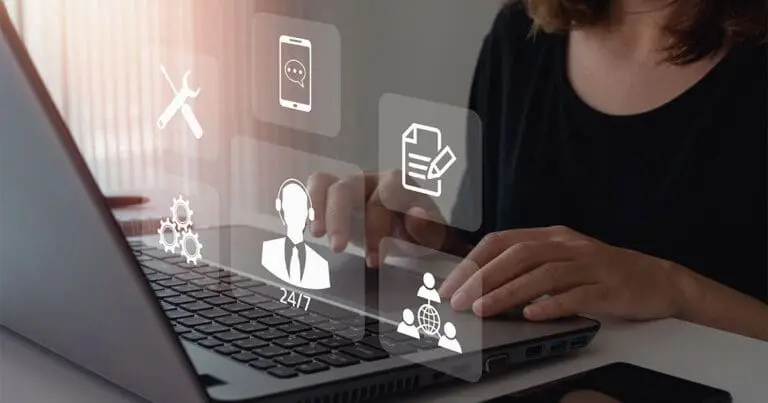Cultivating Empathetic Leadership to Become an Effective Remote Leader

The shift towards remote work has significantly impacted leadership styles, necessitating a pivot towards more understanding and empathetic leadership.
Empathy becomes a critical leadership skill in remote work environments, essential for navigating the unique challenges and dynamics of distributed teams.
Empathetic leadership is not just beneficial but essential for the success of remote teams, fostering a productive work environment and a positive workplace culture.
The importance of empathy in remote leadership
The importance of empathy in remote leadership involves being an empathetic leader, understanding sympathy vs. empathy, and tackling remote work challenges.
Being an empathetic leader
Empathy in leadership means understanding team members’ personal lives, emotions, and challenges.
An empathetic leader demonstrates genuine care and understanding, which is crucial in a remote setting where physical cues are missing.
Remote work can be isolating, and an empathetic leader acknowledges the team’s feelings of loneliness or disconnection.
Understanding sympathy vs. empathy
While sympathy involves feeling compassion for someone, empathy requires putting oneself in another’s shoes.
For senior leaders, empathy skills enable a deeper connection with team members, going beyond mere acknowledgement of a tough time to understanding and addressing their concerns.
Tackling remote work challenges
Remote workers often face isolation and struggle with work-life balance, which can lead to poor communication and a feeling of detachment.
Empathetic leadership directly addresses these issues by recognizing and acting on the life circumstances affecting job performance.
Benefits of empathetic Leadership in remote work
The benefits of empathetic leadership in remote work include enhanced team trust and loyalty, improved communication, and increased productivity and innovation.
Enhanced team trust and loyalty
Empathetic leaders create a safe space for employees to share their concerns without fear of judgment, leading to a more positive and supportive work environment.
Understanding and addressing the personal challenges of team members can build stronger bonds, trust, and loyalty.
Improved communication
Empathy plays a key role in fostering open and honest communication channels.
Empathetic leaders encourage team members to share their thoughts and feelings, improving team dynamics.
This open communication culture ensures that every member feels heard and valued, significantly enhancing collaboration and productivity.
Increased productivity and innovation
Empathy leads to a more engaged and motivated workforce, as team members feel valued and understood.
By showing genuine care for team members’ well-being, leaders create a productive work environment that is conducive to innovation.
This nurturing approach propels teams towards achieving exceptional results, with innovation flourishing in a culture grounded in empathy and mutual respect.
Key practices for developing and demonstrating empathy
Some key practices for developing and demonstrating empathy are active listening, regular check-ins, flexibility and support, and celebrating achievements.
Active listening for empathetic leadership
Active listening requires giving undivided attention to understanding team members’ perspectives and feelings truly.
This practice is a cornerstone of empathetic leadership skills.
Regular check-ins for empathetic leadership
Frequent and casual conversations beyond work-related topics can help leaders maintain a pulse on team members’ well-being and foster a sense of common ground.
These interactions provide valuable insights into the personal lives and challenges that team members may be facing.
Establishing this type of connection encourages a more cohesive and empathetic work culture.
Flexibility and support for empathetic leadership
Tailoring support to individual team members’ needs and circumstances is a hallmark of effective leadership, demonstrating a leader’s flexibility and deep commitment to their team’s success.
Understanding and adapting to these personal variables ensures that support is not only offered but is meaningfully impactful.
Celebrating achievements for empathetic leadership
Acknowledging both team and individual successes can have a positive impact on morale and motivation, reinforcing the value of each team member’s contribution.
Celebrating achievements fosters a culture of recognition and appreciation, further solidifying the bonds within the team.
Overcoming challenges of maintaining empathetic leadership
Overcoming challenges of maintaining empathetic leadership includes growing and evolving teams, leveraging tools and tech, and balancing professionalism with with personal connection.
Growing and evolving teams
As teams grow and diversify, leaders may find it increasingly challenging to maintain a high level of empathy due to team members’ varying needs and backgrounds.
It becomes essential for leaders to develop scalable strategies that ensure empathy is embedded in the culture and processes of the organization.
This approach aids in accommodating the changing dynamics and retaining effective leadership amidst the evolution of team structures.
Leveraging tools and tech
In today’s digital era, a variety of tools and technologies are at the disposal of leaders to facilitate empathetic leadership in remote environments.
From communication platforms that allow for seamless video calls and teamwork to project management tools that keep everyone aligned and informed, these technologies enable leaders to stay connected and responsive to team members’ needs.
In addition, feedback applications can provide an anonymous space for employees to share their thoughts and feelings, ensuring every voice is heard and considered.
Balancing professionalism with personal connection
Finding the right balance between being an effective leader and not overstepping personal boundaries is crucial in remote work environments.
Empathetic leaders achieve this by establishing clear expectations and boundaries and maintaining professionalism.
At the same time, they show genuine care and interest in the well-being of their team members, fostering a supportive and understanding work culture.
The future of empathetic leadership
The future of empathetic leadership entails leveraging leadership development programs, understanding long-term impacts, and developing critical skills.
Leveraging leadership development programs
Leadership development programs focusing on honing empathetic leadership skills are pivotal for nurturing inclusive and agile organizational cultures.
These programs are tailored to equip leaders with the ability to understand and resonate with the emotions of their team members, fostering a supportive and collaborative work environment.
In the long run, such initiatives can significantly contribute to cultural cohesion and sustained business growth, creating an ecosystem where empathy is valued as a fundamental leadership quality.
Understanding long-term impacts of empathetic leadership
The sustained positive impact of empathetic leadership on organizational culture and success cannot be overstated.
It lays the groundwork for a resilient and adaptable workforce, fostering an environment where employees feel understood and valued.
This, in turn, drives innovation, employee retention, and overall organizational performance, proving that empathy is not just beneficial but essential in modern leadership.
Developing critical skills
Current and aspiring leaders are called to action to cultivate empathy as a fundamental skill in today’s rapidly evolving professional landscape.
This soft skill is crucial for navigating the complexities of the modern workplace, where diversity of thought and background enriches the tapestry of a team.
Recognizing and valuing this diversity through empathetic leadership can significantly enhance team cohesion and drive innovative outcomes.
Being an empathetic leader in a remote workforce
The key to successful remote leadership lies in demonstrating empathy.
The importance of empathetic leadership in addressing the unique challenges of remote work, enhancing team trust, improving communication, and driving productivity and innovation cannot be understated.
Empathetic leadership’s transformative power shapes the future of work, making it a critical skill for leaders in today’s digital age.
By fostering an empathetic work culture, leaders can build more resilient and collaborative teams poised for success in a remote environment.
Looking to hire top-tier Tech, Digital Marketing, or Creative Talent? We can help.
Every year, Mondo helps to fill over 2,000 open positions nationwide.
More Reading…
- Embracing the 32-Hour Work Week & Talent Retention
- The Ripple Effects of Meta’s AI Hiring Blitz on the Tech Job Market
- AI You Didn’t Realize Your Organization Is Already Using
- The Latest Innovations in Health and Wellness Technology
- Green Tech: 5 Sustainability Innovations in the Tech Sector
- How to Write an ATS-Friendly Resume in 2024
- Unionized College Athletes: Dartmouth Sets a Precedent for Change
- Quantifying a Project Manager’s Success to Advocate for Hiring
- Breaking the Code: How Women are Shaping the Future of Cybersecurity
- The Rise of AI Majors: Transforming the US Job Market
- Tips to Leverage Your Onboarding Process for Employee Retention
- 10 Tech Jobs That Saw the Highest Salary Growth This Year
- Highest Paid Data Science Roles & Top Salaries



